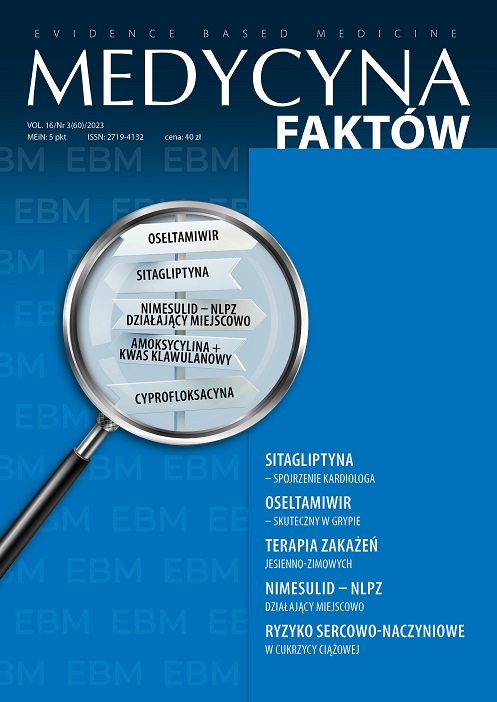Betahistyna i preparaty złożone zawierające cynaryzynę i dimenhydrynat w leczeniu przedsionkowych zawrotów głowy Artykuł przeglądowy
##plugins.themes.bootstrap3.article.main##
Abstrakt
Betahistyna jest szeroko stosowana w terapii przedsionkowych zawrotów głowy o różnej etiologii. Ostatnio w leczeniu przedsionkowych zawrotów głowy stosowane są również preparaty złożone zawierające cynaryzynę i dimenhydrynat. Nie wykazują one większej skuteczności niż betahistyna, a ponadto krótki dopuszczalny okres leczenia (do 4 tygodni) i działania niepożądane, takie jak senność i wpływ na zdolność prowadzenia pojazdów i obsługiwania maszyn, ograniczają ich zastosowanie. Z tego względu preparaty te mogą być krótkotrwale stosowane w ostrym okresie westybulopatii, także w polifarmakoterapii z betahistyną.
##plugins.themes.bootstrap3.article.details##
Jak cytować
Berkowicz , T. (2023). Betahistyna i preparaty złożone zawierające cynaryzynę i dimenhydrynat w leczeniu przedsionkowych zawrotów głowy. Medycyna Faktów , 16(3(60), 378-381. https://doi.org/10.24292/01.MF.0323.18
Numer
Dział
Artykuły
Copyright © by Medical Education. All rights reserved.
Bibliografia
1. Neuhauser HK. The epidemiology of dizziness and vertigo. Handb Clin Neurol. 2016; 137: 67-82. http://doi.org/10.1016/B978-0-444-63437-5.00005-4.
2. Corrales CE, Bhattacharyya N. Dizziness and death: An imbalance in mortality. Laryngoscope. 2016; 126(9): 2134-6. http://doi.org/10.1002/lary.25902.
3. Lea J, Pothier D (ed). Vestibular Disorders. Adv Otorhinolaryngol. Basel, Karger 2019; 82: 143-9.
4. Terroso M, Rosa N, Torres Marques A et al. Physical consequences of falls in the elderly: a literature review from 1995 to 2010. Eur Rev Aging Phys Act. 2014; 11: 51-9. http://doi.org/10.1007/s11556-013-0134-8.
5. Brandt T, Huppert T, Hüfner K et al. Long-term course and relapses of vestibular and balance disorders. Restor Neurol Neurosci. 2010; 28(1): 69-82. http://doi.org/10.3233/RNN-2010-0504.
6. Neuhauser HK, von Brevern M, Radtke A et al. Epidemiology of vestibular vertigo: a neurotologic survey of the general population. Neurology. 2005; 65(6): 898-904. http://doi.org/10.1212/01.wnl.0000175987.59991.3d. Erratum in: Neurology. 2006; 67(8): 1528.
7. Neuhauser HK, Lempert T. Vertigo: epidemiologic aspects. Semin Neurol. 2009; 29(5): 473-81. http://doi.org/10.1055/s-0029-1241043.
8. Odyniec A. Betahistine in treatment of vestibular vertigo ? from molecular mechanism to clinical effect. Vertigoprofil. 2015; 7(2): 2-7.
9. Berkowicz T. Betahistine in the treatment of vertigo of different etiology. Neuropsychiatria. 2017; 9(3): 95-100.
10. Murdin L, Hussain K, Schilder AG. Betahistine for symptoms of vertigo. Cochrane Database Syst Rev. 2016; 2016(6): CD010696. http://doi.org/10.1002/14651858.CD010696.pub2.
11. Benecke H, Pérez-Garrigues H, Bin Sidek D et al.; OSVaLD investigators. Effects of betahistine on patient-reported outcomes in routine practice in patients with vestibular vertigo and appraisal of tolerability: experience in the OSVaLD study. Int Tinnitus J. 2010; 16(1): 14-24.
12. Sienkiewicz-Jarosz H. Betahistyna w tabletkach ulegających rozpadowi w jamie ustnej w terapii pacjentów z zawrotami głowy. Vertigoprofil. 2016; 8(1): 14-7.
13. Maciejewska B. Wybrane aspekty farmakoterapii zawrotów głowy. Med Dypl. 2020; 29(9): 7381.
14. CHARAKTERYSTYKA PRODUKTU LECZNICZEGO. Symtiver (access: 12.09.2023).
15. CHARAKTERYSTYKA PRODUKTU LECZNICZEGO. Artigo (access: 12.09.2023).
16. Scholtz AW, Waldfahrer F, Hampel R et al. Efficacy and Safety of a Fixed-Dose Combination of Cinnarizine 20 mg and Dimenhydrinate 40 mg in the Treatment of Patients with Vestibular Vertigo: An Individual Patient Data Meta-Analysis of Randomised, Double-Blind, Controlled Clinical Trials. Clin Drug Investig. 2022; 42(9): 705-20. http://doi.org/10.1007/s40261-022-01184-0.
17. Teggi R, Gatti O, Sykopetrites V et al. Association of cinnarizine and betahistine in prophylactic therapy for Méni?re?s disease with and without migraine. Acta Otorhinolaryngol Ital. 2014; 34(5): 349-53.
18.Asadi P, Zia Ziabari SM, Majdi A et al. Cinnarizine/betahistine combination vs. the respective monotherapies in acute peripheral vertigo: a randomized triple-blind placebo-controlled trial. Eur J Clin Pharmacol. 2019; 75(11): 1513-9. http://doi.org/10.1007/s00228-019-02741-x.
2. Corrales CE, Bhattacharyya N. Dizziness and death: An imbalance in mortality. Laryngoscope. 2016; 126(9): 2134-6. http://doi.org/10.1002/lary.25902.
3. Lea J, Pothier D (ed). Vestibular Disorders. Adv Otorhinolaryngol. Basel, Karger 2019; 82: 143-9.
4. Terroso M, Rosa N, Torres Marques A et al. Physical consequences of falls in the elderly: a literature review from 1995 to 2010. Eur Rev Aging Phys Act. 2014; 11: 51-9. http://doi.org/10.1007/s11556-013-0134-8.
5. Brandt T, Huppert T, Hüfner K et al. Long-term course and relapses of vestibular and balance disorders. Restor Neurol Neurosci. 2010; 28(1): 69-82. http://doi.org/10.3233/RNN-2010-0504.
6. Neuhauser HK, von Brevern M, Radtke A et al. Epidemiology of vestibular vertigo: a neurotologic survey of the general population. Neurology. 2005; 65(6): 898-904. http://doi.org/10.1212/01.wnl.0000175987.59991.3d. Erratum in: Neurology. 2006; 67(8): 1528.
7. Neuhauser HK, Lempert T. Vertigo: epidemiologic aspects. Semin Neurol. 2009; 29(5): 473-81. http://doi.org/10.1055/s-0029-1241043.
8. Odyniec A. Betahistine in treatment of vestibular vertigo ? from molecular mechanism to clinical effect. Vertigoprofil. 2015; 7(2): 2-7.
9. Berkowicz T. Betahistine in the treatment of vertigo of different etiology. Neuropsychiatria. 2017; 9(3): 95-100.
10. Murdin L, Hussain K, Schilder AG. Betahistine for symptoms of vertigo. Cochrane Database Syst Rev. 2016; 2016(6): CD010696. http://doi.org/10.1002/14651858.CD010696.pub2.
11. Benecke H, Pérez-Garrigues H, Bin Sidek D et al.; OSVaLD investigators. Effects of betahistine on patient-reported outcomes in routine practice in patients with vestibular vertigo and appraisal of tolerability: experience in the OSVaLD study. Int Tinnitus J. 2010; 16(1): 14-24.
12. Sienkiewicz-Jarosz H. Betahistyna w tabletkach ulegających rozpadowi w jamie ustnej w terapii pacjentów z zawrotami głowy. Vertigoprofil. 2016; 8(1): 14-7.
13. Maciejewska B. Wybrane aspekty farmakoterapii zawrotów głowy. Med Dypl. 2020; 29(9): 7381.
14. CHARAKTERYSTYKA PRODUKTU LECZNICZEGO. Symtiver (access: 12.09.2023).
15. CHARAKTERYSTYKA PRODUKTU LECZNICZEGO. Artigo (access: 12.09.2023).
16. Scholtz AW, Waldfahrer F, Hampel R et al. Efficacy and Safety of a Fixed-Dose Combination of Cinnarizine 20 mg and Dimenhydrinate 40 mg in the Treatment of Patients with Vestibular Vertigo: An Individual Patient Data Meta-Analysis of Randomised, Double-Blind, Controlled Clinical Trials. Clin Drug Investig. 2022; 42(9): 705-20. http://doi.org/10.1007/s40261-022-01184-0.
17. Teggi R, Gatti O, Sykopetrites V et al. Association of cinnarizine and betahistine in prophylactic therapy for Méni?re?s disease with and without migraine. Acta Otorhinolaryngol Ital. 2014; 34(5): 349-53.
18.Asadi P, Zia Ziabari SM, Majdi A et al. Cinnarizine/betahistine combination vs. the respective monotherapies in acute peripheral vertigo: a randomized triple-blind placebo-controlled trial. Eur J Clin Pharmacol. 2019; 75(11): 1513-9. http://doi.org/10.1007/s00228-019-02741-x.
